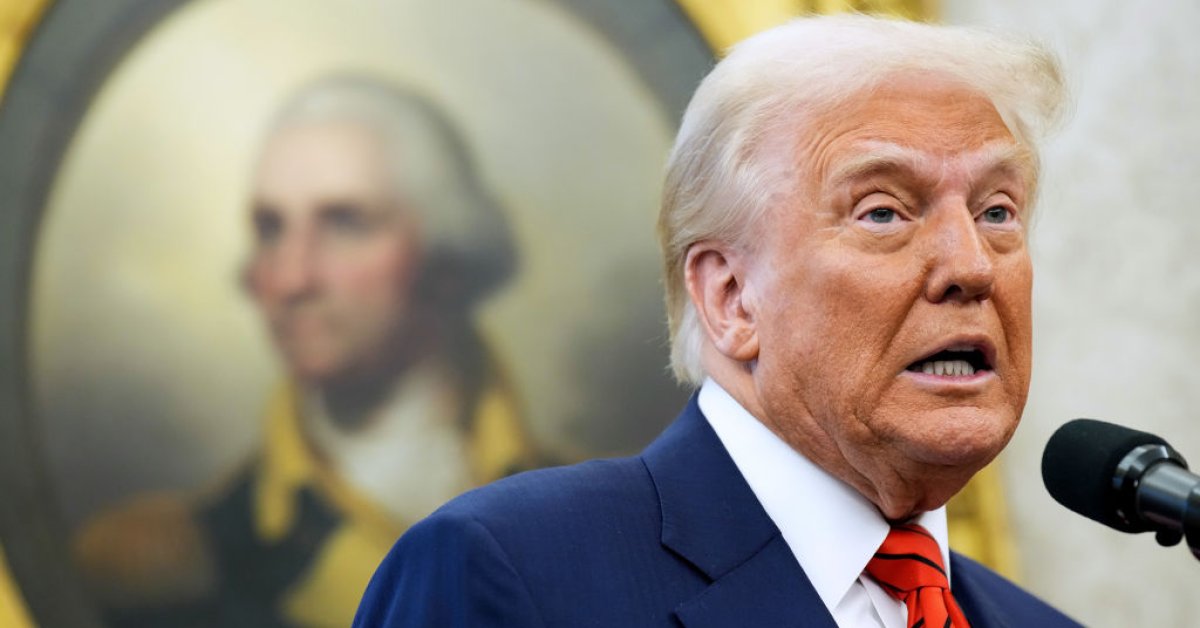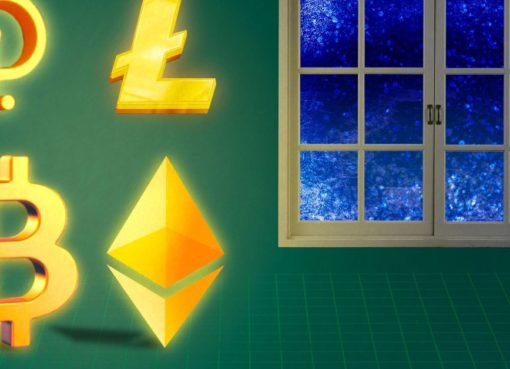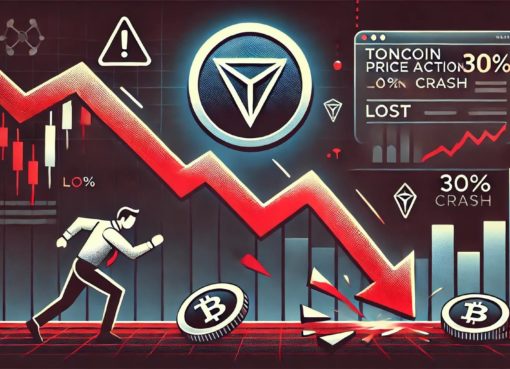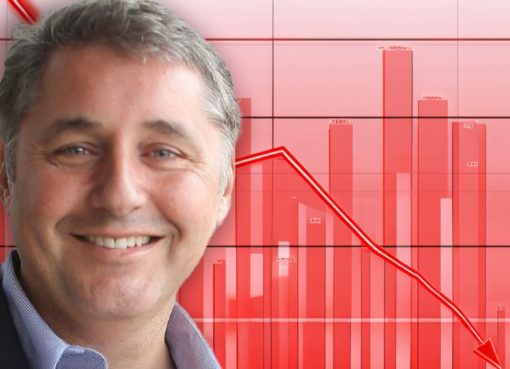It’s been a volatile few days for the stock market since President Donald Trump’s April 2 announcement of 10% baseline tariffs on all imported goods, as well as additional import taxes on 60 countries. On April 9, Trump went on to pause most of his tariffs for three months, while keeping in place the 10% baseline and significantly increasing the tax on imports from China.
The stock market immediately surged after Trump announced his “90-day pause.” The S&P 500 rocketed more than 9% Wednesday afternoon, though the Thursday saw a return to extreme volatility as the Dow dropped 1,900 points and the S&P 500 dipped 5%.
Hours before he announced the pause, as stocks were still in negative territory over an intensifying trade war, Trump posted messages on his social media platform, Truth Social, that seemed to be addressed to investors. “THIS IS A GREAT TIME TO BUY!!!” the President wrote, signing off with his initials “DJT,” which also serve as the stock symbol for his company, Trump Media and Technology Group Corp. It was noticeable that Trump signed the post with his initials—something he does not always do. Trump Media and Technology Group saw its stocks shoot up nearly 22% after the announcement of the tariff reversal on Wednesday and they were up a further 5% in pre-market trading early Thursday morning.
“BE COOL! Everything is going to work out well. The USA will be bigger and better than ever before!” Trump had said in another post as the markets opened on Wednesday morning, just a few hours before he posted his decision to pause his tariffs for 90 days.
Lawmakers have made accusations of “insider trading”
Senator Adam Schiff, a California Democrat, called on Wednesday for an investigation into Trump’s “great time to buy” post, flagging it as potential proof of insider trading or stock market manipulation.
“Family meme coins and all the rest of it are not beyond insider trading or enriching themselves. I hope to find out soon,” Schiff told TIME. (Trump previously received criticism over the launching of his Trump meme coins in January.)
According to the U.S. Securities and Exchange Commission (SEC), market manipulation is when “someone artificially affects the supply or demand for a security,” which can include spreading false information or rigging quotes, prices, or trades to make it look like there is more demand.
Insider trading, on the other hand, is described as “buying or selling a security, in breach of a fiduciary duty or other relationship of trust and confidence, on the basis of material, nonpublic information about the security.” A classic example of this would be if someone privy to information that would change a volatile stock market let their close family or friends know, so that they could either sell or buy stocks in the hopes of turning a profit.
Schiff and other Democrats in Congress argue that the timing of Trump’s post raises “legal and ethic concerns,” and that Trump should make clear who knew about his tariff reversal decision before he announced it, and if any of those people let others know about Trump’s decision. When asked about the timing of his decision to pause most tariffs, and when he had settled on that, Trump said in the Oval Office on Wednesday that he had been considering it “for a period of time.” He explained: “I wouldn’t say this morning. Over the last few days, I’ve been thinking about it… I think it probably came together early this morning.”
A letter sent to Trump’s White House Chief of Staff Susie Wiles and Jamieson Greer, Acting Director of the U.S. Office of Government Ethics, on Thursday by Schiff and Sen. Ruben Gallego, an Arizona Democrat, addressed a number of concerns. They called for a review of “any communications between White House and executive branch agency employees… and external parties, including financial institutions, brokers, dealers… that may have included non-public information.” As a Senator, Schiff can investigate these claims, but lacks the subpoena power that a Congressional committee might employ in such an investigation.
Rep. Alexandria Ocasio-Cortez, a New York Democrat, also spoke out, calling for all members of Congress to disclose any stocks they had bought in the past 24 hours. “I’ve been hearing some interesting chatter on the floor,” she wrote on X on Wednesday night. “Disclosure deadline is May 15th. We’re about to learn a few things. It’s time to ban insider trading in Congress.”
In Schiff’s letter of inquiry, he singles out Elon Musk, who’s played a high-profile role in the Trump Administration through the Department of Government Efficiency (DOGE).
“[Stock] in Elon Musk’s company, Tesla, increased 18% immediately following the President’s announcement to pause most tariffs, which Mr. Musk had publicly opposed,” Schiff wrote.
Meanwhile, House Minority Leader Hakeem Jeffries, a New York Democrat, said on Thursday that House Democrats will be launching investigations into “possible stock manipulation.”
Read More: Trump Wants to Spin His Tariff Pause as a Win. It’s Not
What are experts saying about the “insider trading” accusations leveled at Trump?
Karen Woody, professor of law at Washington and Lee School of Law, says that an investigation into whether the President or others in his circle engaged in insider trading or other illegal financial transactions is “valid.”
“This isn’t a witch hunt, where it seems like allegations that have come out of thin air. This is a pretty clear example of what we would say is some potential of real market manipulation by someone who has the ability to move the markets,” Woody says.
Typically, the next steps, according to Woody, would be for the SEC to investigate these accusations, “given that [the SEC] is sort of the market watchdog.”
However, Adam Pritchard, law professor at the University of Michigan, says that Trump’s Truth Social post itself was “pretty clearly not insider trading,” unless there is evidence that Trump himself was trading or providing more detailed information to others privately.
“If he [the President] says things, you know, to Donald [Trump] Jr, and then Donald Jr. goes and trades on those things, when he was the only one who heard about it, then we’ve got an issue, right?” he says. “But when [Trump] says things at a press conference or on social media, then, no, it’s not insider trading.”
Insider trading law can make violations of it difficult to identify, says Kevin Douglas, an assistant law professor at Michigan State University, who notes there are no federal statutes that explicitly prohibit insider trading and current case law doesn’t provide a road map.
“The Stock Act, which prohibits the President and federal employees from trading on non-public information, defines non-public information in a way that keeps the law fatally ambiguous,” Douglas tells TIME in an emailed statement, highlighting how the lack of a clear definition can complicate matters.
Woody notes that the situation around Trump’s tariff pause is particularly murky, as the same key players are involved across the board.
“This is an instance where you have the creators of the crisis, then those who are able to either throw fuel on the fire or try to douse it all, being the same people,” Woody says. “These [Trump] tariff policies are what created this market crash. And then [with] the stroke of—not even the pen, but [Trump’s social media post]—you can fix that. Of course people who know about that are able to take a significant advantage.”




